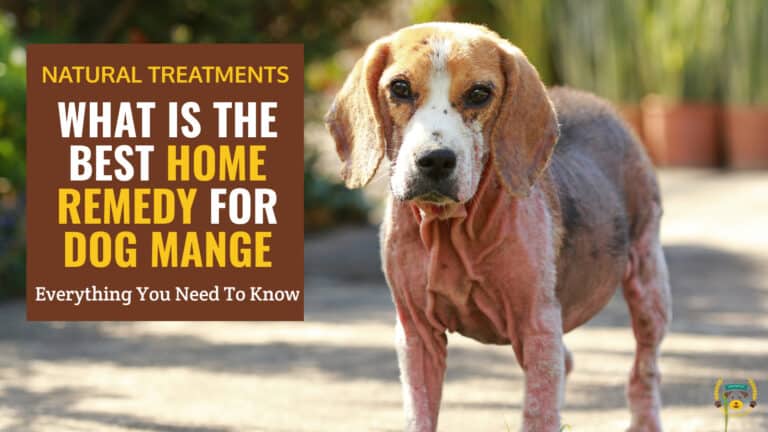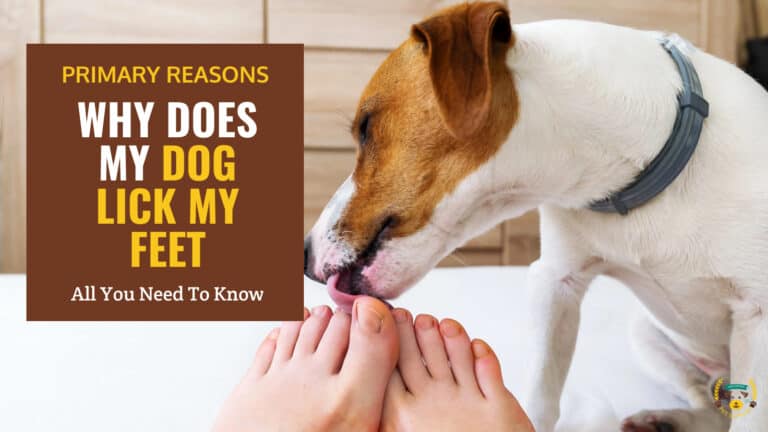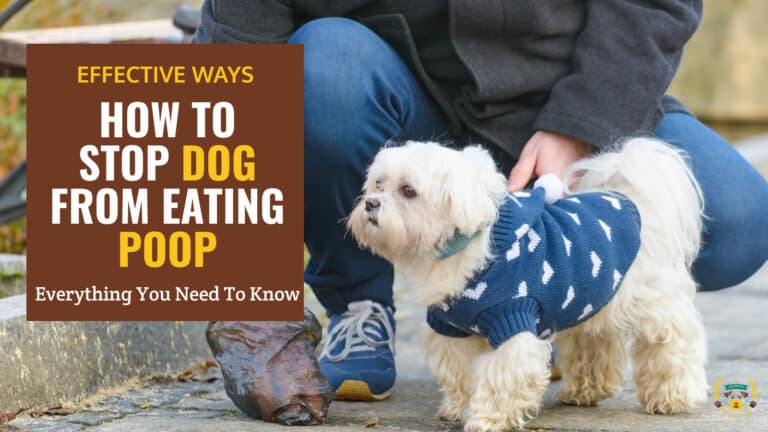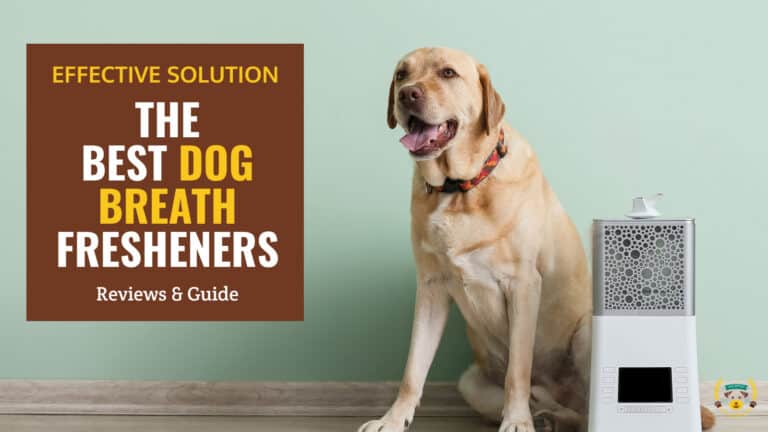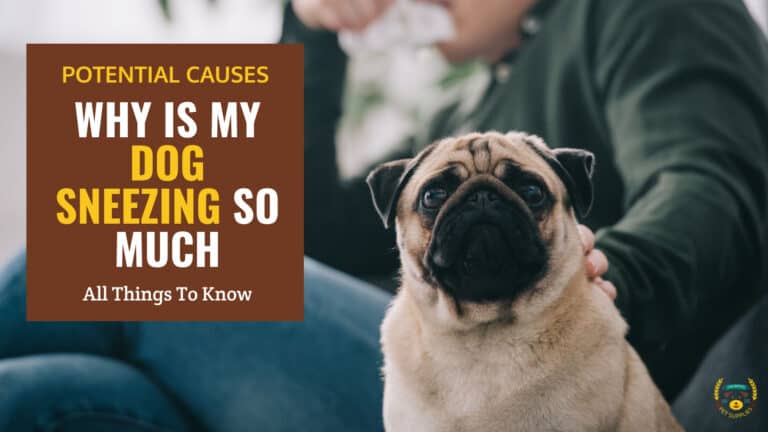Why Is My Dog Breathing Heavy?
Last updated: February 12, 2024
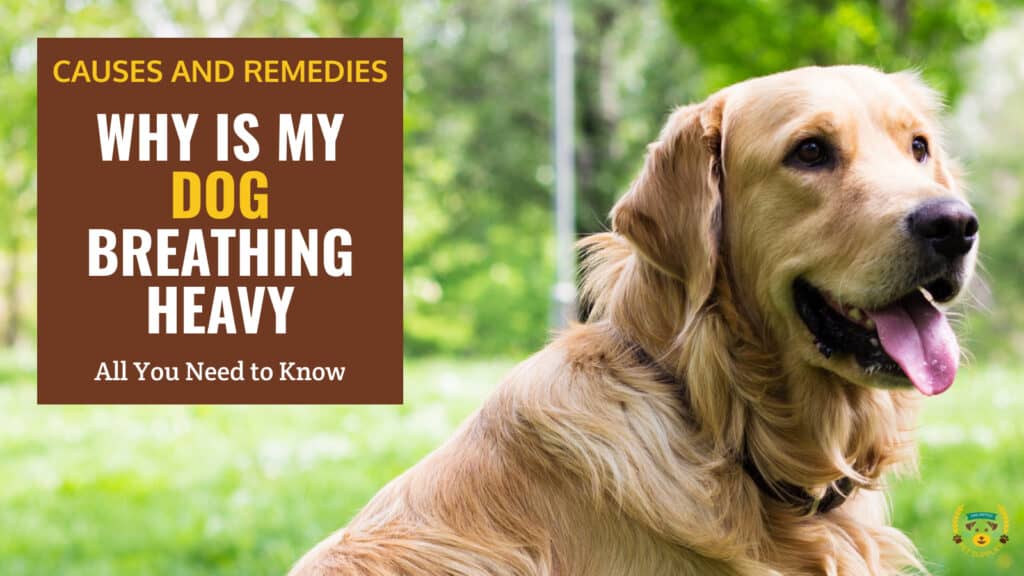
Summary
- Heavy breathing in dogs can be normal after exercise or in hot weather, but consistent panting at rest may signal a health issue.
- Common causes include respiratory infections, heart disease, anemia, obesity, and allergies.
- If your dog breathes over 40 times per minute, has noisy breathing, pale gums, or trouble standing, seek immediate veterinary attention.
- Regular vet checkups, avoiding triggers, and maintaining a healthy weight can help prevent breathing problems.
Heavy breathing, also called labored breathing, refers to dogs taking more frequent or deeper breaths than normal. Their chest and sides may move in and out rapidly as they struggle to get enough air.
Some degree of heavy panting is common after exercise or on hot days. However, consistent heavy breathing can indicate an underlying health problem. Distressed breathing that does not resolve on its own warrants veterinary attention.
In this article, we will explore the causes and remedies for this frequent problem in dogs.
- 1) When to Be Concerned About Heavy Breathing?
- 2) Common Causes of Heavy Breathing in Dogs
- 3) Diagnosing the Cause of Heavy Breathing
- 4) Treating Heavy Breathing in Dogs
- 5) Preventing Heavy Breathing Issues
-
6)
Frequently Asked Questions
- 6.1) Is heavy breathing always a sign of a serious problem?
- 6.2) When should heavy breathing warrant an emergency vet visit?
- 6.3) Can lung infections from kennels cause temporary heavy breathing?
- 6.4) Do brachycephalic dogs always have labored breathing?
- 6.5) Can allergies alone cause life-threatening breathing problems?
- 6.6) Should old dogs see the vet more often to monitor breathing issues?
- 7) Final Thoughts
When to Be Concerned About Heavy Breathing?
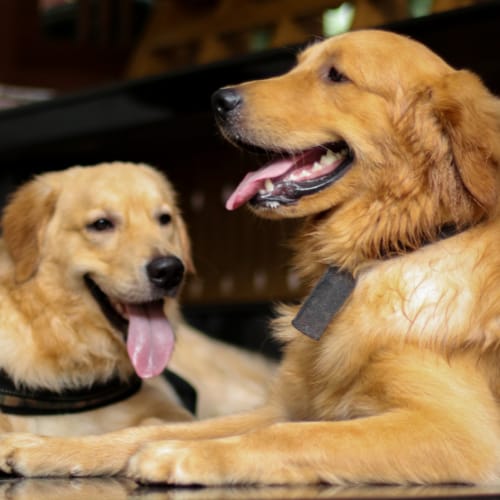
Dogs normally take 10 to 30 breaths per minute. Heavy breathing is classified as more than 40 breaths per minute. Panting after play or on a warm day is okay, but consistent heavy panting may signal issues. See your vet promptly if your dog shows these signs along with heavy breathing:
- Breathing over 40 times per minute at rest
- Noisy breathing such as wheezing or raspy sounds
- Open-mouth breathing with tongue hanging out
- Breathing heavily all the time
- Bluish gums or pale membranes
- Collapsing or trouble standing up
Rapid breathing from stress, heat, or exercise should resolve once the trigger is gone. If not, an underlying condition likely needs veterinary attention. Early intervention can be crucial.
Common Causes of Heavy Breathing in Dogs
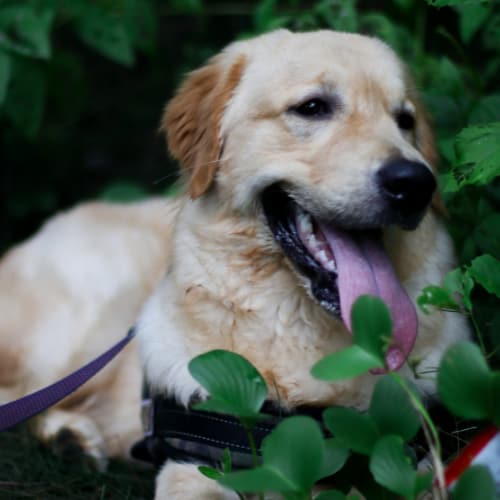
Some common reasons dogs may breathe heavily include the following:
Exercise and Excitement
It's typical for dogs to pant hard during and after strenuous activity to cool themselves. Some breeds like pugs and bulldogs may sound congested even with normal exercise.
Additionally, panting can happen when a dog is very excited or anxious. Training methods that leverage a dog's intelligence can help control excitable behavior that leads to heavy breathing.
However, if your dog's bad breath persists even after addressing behavioral issues, it could be a sign of an underlying health problem. Learn more about potential causes and solutions for dog bad breath in our vet recommended dog breath fresheners guide.
Heat Stroke
Dogs don't sweat like humans. Panting helps lower their body temperature. In hot weather or confined spaces like cars, dogs risk developing heat stroke from elevated body heat and oxygen deprivation.
Rapid, noisy panting, along with symptoms like lethargy, drooling, and reddened gums, indicate a dog may be overheating. This is a dire emergency requiring immediate vet treatment.
Respiratory Disease
Bacterial and viral infections often affect a dog's upper or lower respiratory tract. These include kennel cough, pneumonia, bronchitis, flu, and more. Sneezing, coughing, runny nose and breathing difficulty signal respiratory illness.
Chronic conditions like collapsed trachea, laryngeal paralysis and chronic bronchitis can also hamper normal breathing over time. Vets determine the exact cause through diagnostic testing.
Heart Disease
Enlarged heart, irregular heart rhythms, weak heart muscle and other cardiac issues impair circulation. Fluid can back up into the lungs causing congestion, coughing fits and labored breathing.
Some breeds like cavalier King Charles spaniels are prone to genetic heart defects leading to breathing struggles. Catching heart disease early is crucial.
Anemia
This blood disorder leaves insufficient red blood cells and hemoglobin to transport oxygen through the body. Anemic dogs often have rapid, shallow breathing to compensate for inadequate oxygen.
Gastrointestinal bleeding, blood parasites, kidney disease and bone marrow problems can trigger anemia. Check gums and membranes for pale color indicating oxygen deprivation.
Obesity
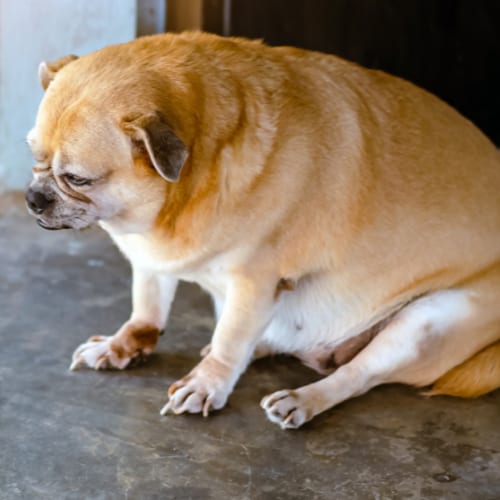
Carrying excess weight puts more strain on respiration. Obese dogs pant more to meet their body's increased oxygen needs. Fat deposits in throat tissue can obstruct airways too.
Monitoring calorie intake and maintaining lean body composition helps take pressure off the respiration system.
Allergies
Inhaled irritants like pollen, dander and chemicals spark inflammatory responses in dogs. The resulting airway inflammation, mucus and swelling make breathing labored.
Itchy skin, recurrent ear infections and gastrointestinal issues are often concurrent in dogs with breathing struggles triggered by allergies.
Stay observant of patterns around when and where breathing problems occur. This helps identify environmental allergy sources to avoid.
Learn more about potential causes and solutions for dog bad breath in our dog breath fresheners guide.
Diagnosing the Cause of Heavy Breathing
Since multiple conditions can cause labored breathing in dogs, veterinary testing helps pinpoint the exact trigger to guide appropriate treatment.
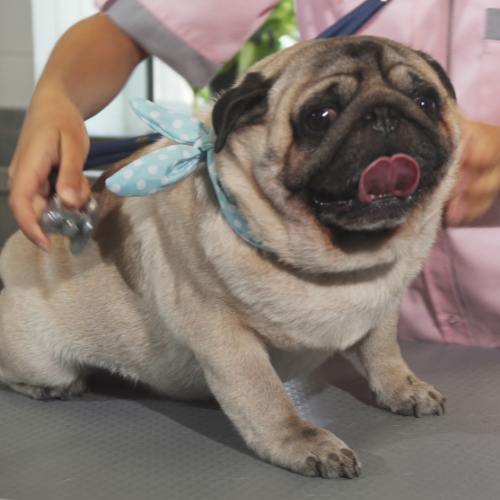
Veterinary Exam and Diagnostic Tests
Vets start by asking about your dog’s health history and when breathing problems occur. They’ll listen to your dog’s chest with a stethoscope for abnormal sounds signaling disease.
Further diagnostic tests may include:
- Blood tests checking oxygen levels, anemia, organ issues, infections, etc.
- Chest X-rays visualizing the heart, lungs and airways.
- Endoscopy to examine throat and airway tissue.
- Imaging tests like an electrocardiogram or ultrasound of the heart.
- Testing for allergies using skin or blood tests.
Assessing the Home Environment
Your vet may ask about potential allergens, irritants or unhealthy conditions at home possibly impacting breathing ability. Be prepared to describe:
- Any recent changes in the home like new furniture, remodeling, visitors, etc.
- Cleaning supplies, candles or air fresheners used indoors.
- Time spent outdoors, including plants and pollens in the environment.
- Diet and daily routine.
Take notes if breathing worsens in any specific location or scenario.
Monitoring Breathing Patterns
Keep a health journal tracking your dog’s respiratory rate, effort and any worrisome symptoms across different times, activities and environments. Note any potential triggers connected to heavy breathing episodes.
Provide this breathing journal to your vet. It can reveal crucial patterns to pinpoint the causes and effective treatment plans. Call the vet right away if the symptoms ever advance to an emergency.
Treating Heavy Breathing in Dogs
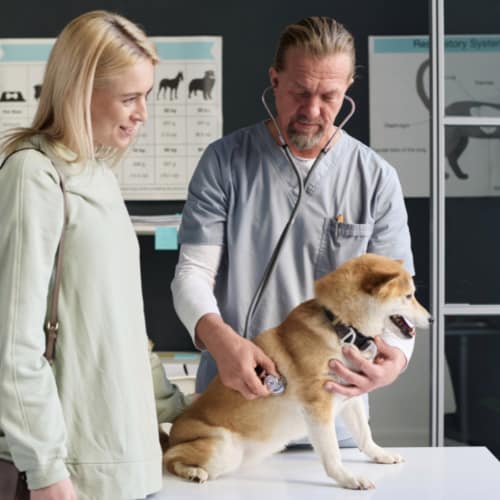
Treatment targets the specific illness or condition causing breathing challenges. Prompt veterinary attention offers the best chance of effective management.
Dogs may also exhibit heavy breathing when they are anxious or stressed. For example, some dogs bark excessively or at random times due to anxiety. Understanding the underlying causes of this behavior can help owners address the issue appropriately. Possible reasons why dogs bark at nothing provides more insight into dogs' unexplained vocalizations.
Medical Treatments
After pinpointing the trigger for heavy breathing, vets develop customized treatment plans which may include:
- Medications like steroids, diuretics and bronchodilators to reduce inflammation and open restricted airways.
- Antibiotics for bacterial respiratory infections. Antivirals help with some viral cases.
- Oxygen therapy provides extra respiratory support when oxygen levels are critically low.
- Surgery for tube placement or to remove obstructions narrowing airways.
- Treating underlying conditions like heart disease, anemia or obesity.
Follow the vet's instructions for giving medications properly and schedule follow-ups to monitor progress. Alert the vet if problems worsen despite the treatment.
Lifestyle and Home Remedies

Certain at-home measures can also aid medical breathing treatments:
- Give cool water and provide shade on hot humid days.
- Use air filtration systems to reduce airborne allergens.
- Avoid exposing your dog to known triggers like smoke.
- Maintain healthy body weight through proper diet and exercise.
- Try calming aids during stressful situations causing anxious panting.
Never give over-the-counter human medications without checking with your vet first regarding pet safety and dosage.
Emergency Procedures
Urgently contact emergency vet services if your dog shows any of these acute distress signs:
- Collapsing or inability to stand
- Pale gums
- Gasping, gaping mouth motions without improvement
- Abnormal color like bluish skin/tongue
Rapid transport and oxygen therapy are crucial to prevent respiratory failure once a crisis hits. Quick action saves lives.
Preventing Heavy Breathing Issues
While some respiratory conditions are inevitable, certain prevention strategies help reduce breathing challenges in dogs.
Regular Veterinary Checkups
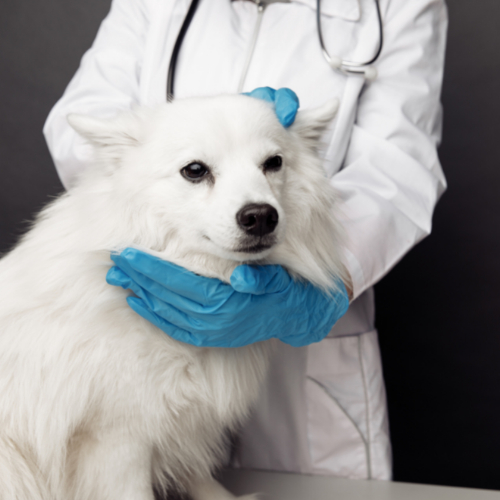
Wellness exams every six months catch early signs of disease. Testing for heart health, thyroid function and exposure to lung irritants establishes baselines for comparison if breathing worsens later.
Senior dogs over seven years old should see the vet yearly at minimum for more extensive screening. Stay vigilant for coughing or breathing changes in aging pets.
Avoid Triggers
If allergies or airborne irritants are the culprit, keep your dog away from those specific triggers. Use air filters and control humidity levels indoors.
Restrict exercise on hot humid days when dogs are more prone to overheating and respiratory distress. Don't leave dogs confined in cars during warm weather.
Also, prevent infectious causes by avoiding contact with sick dogs and keeping core vaccines like kennel cough updated. Follow parasite prevention and flea/tick control year-round.
Maintain Healthy Weight

Extra body weight puts more strain on the lungs and chest wall. Ensure your dog maintains optimal lean weight through measured feeding, regular exercise and vet guidance.
Weight loss relieves excess pressure on the breathing mechanisms. This effect can significantly ease or resolve breathing problems in overweight pets.
A balanced diet is crucial for maintaining a healthy weight in dogs, which can in turn prevent respiratory problems associated with obesity.
If you're unsure about the nutritional content of your dog's current food or are considering making the switch to homemade meals, be sure to consult with a veterinarian or canine nutritionist to ensure their diet meets all their needs. You can also explore our informative article about homemade dog food vs commercial brands to learn more about the pros and cons of each option and make the best choice for your furry friend's health and well-being.
With vigilance, prompt treatment when necessary and lifestyle management, owners can help their dogs breathe easier for years to come. Stay alert to changes and partner closely with your vet if problems develop. Respiratory health in dogs requires ongoing care and awareness.
Frequently Asked Questions
The following are some of the frequently asked questions with answers to help you further understand the issue of heavy breathing and be prepared in case it happens to your canine friend(s).
Is heavy breathing always a sign of a serious problem?
No, heavy breathing by itself does not necessarily indicate a major issue. Dogs naturally pant hard during physical exertion and hot weather as a cooling mechanism. Concern arises when rapid breathing persists at rest or worsens over time.
When should heavy breathing warrant an emergency vet visit?
Seek emergency care if breathing struggles are accompanied by collapsing, severe weakness, inability to stand, pale gums or tongue, gagging/choking, or bluish skin indicating oxygen deprivation. These dire signs precede possible respiratory failure.
Can lung infections from kennels cause temporary heavy breathing?
Yes, kennel cough and other contagious respiratory infections often cause temporary breathing issues that resolve with rest and medication. Quarantine sick dogs until cleared by a vet to prevent spreading the illness.
Do brachycephalic dogs always have labored breathing?
Brachycephalic (short-nosed) breeds like pugs tend to experience some breathing issues due to their facial structure. However, severe distress and attacks warrant medical attention to rule out conformational defects or disease complications.
Can allergies alone cause life-threatening breathing problems?
Rarely, but an intense allergic reaction can spark potentially fatal anaphylactic shock with swelling obstructing the airways. Seek emergency care if swelling and distress escalate despite treatment.
Should old dogs see the vet more often to monitor breathing issues?
Yes, senior dogs are at higher risk for age-related respiratory illness like heart disease and cancer. Schedule wellness checks every 6 months to catch problems early when they are most treatable. Track breathing rate and effort at home between visits.
Final Thoughts
Rapid or strenuous breathing is cause for concern when it occurs continuously at rest or worsens over time. While exercise and heat trigger heavy panting normally, consistent struggles may indicate disease.
Watch for red flags like pale gums, collapsing and trouble standing. Seek prompt veterinary care if these acute signs appear as they can precede respiratory failure. Urgent transport and oxygen aid survival chances.
We hope this article helped you better understand the issue of dogs' heavy breathing and prepared you you take appropriate action whenever and as soon as needed. If you still have any questions or comments, please leave them in the comments section below.
Thanks for reading!

